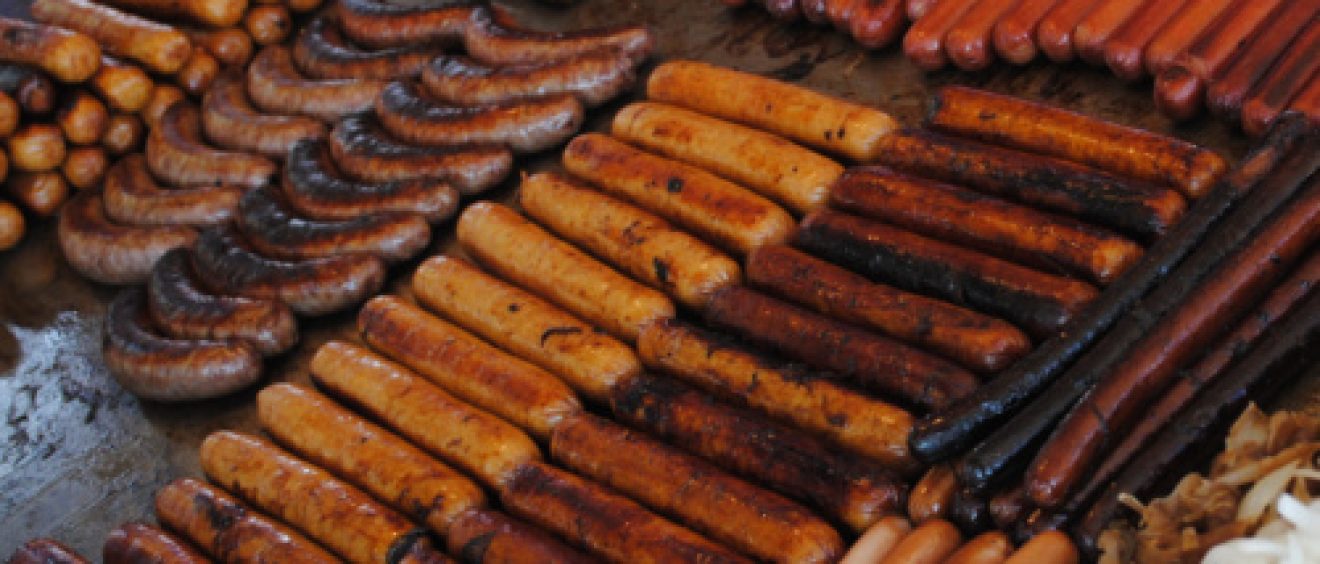
Meatless Monday: Will You Go Meatless For A Day?
Here we go again: conflict in the Middle East and the discussion incessant bitching about gas prices. I can hardly wait until the summer travel season. With a barrel of oil topping $100 for the first time since 2008 (my muscles start to twitch as I remember this era of my finance career), it’s a great time to talk about why our industrial meat system burns my bacon. I still wonder out loud why the average person hasn’t made the broad connection between meat consumption, the environment and the world’s resources.
Mark Bittman got it right three years ago in his New York Times article Rethinking the Meat Guzzler:
Growing meat (it’s hard to use the word “raising” when applied to animals in factory farms) uses so many resources that it’s a challenge to enumerate them all. But consider: an estimated 30 percent of the earth’s ice-free land is directly or indirectly involved in livestock production, according to the United Nation’s Food and Agriculture Organization, which also estimates that livestock production generates nearly a fifth of the world’s greenhouse gases — more than transportation.
As 925 million people in the world suffer from malnutrition he points out the following:
…about two to five times more grain is required to produce the same amount of calories through livestock as through direct grain consumption, according to Rosamond Naylor, an associate professor of economics at Stanford University.
This brings me to my question: will you go meat free for a day?
There are a swath of Meatless Monday participants around the country including Baltimore Public Schools, Sodexho, and University of California Davis. The effort, started in 2003, is in large part directed at public health (heart disease and high cholesterol), but I would argue that we should take a moment to examine our eating patterns.
It is evident that Americans eat what they want, when they want and how they want. But it is interesting to note that there have been recent tax rebate initiatives associated with purchasing hybrid cars, but at the same time the federal government falls silent when it comes to meat consumption as they keep subsidies for cheap food flowing. A University of Chicago study found that by reducing meat consumption by 20 percent, it would produce the same environmental impact as if we switched from a standard sedan to a hybrid:
We say that however close you can be to a vegan diet and further from the mean American diet, the better you are for the planet. It doesn’t have to be all the way to the extreme end of vegan. If you simply cut down from two burgers a week to one, you’ve already made a substantial difference.
It’s nice to poke fun at a semi-vegetarian: a traitor to strict vegetarians and a silly hippie to the meat lovers. It’s not that I don’t like the taste of meat. It’s not that I berate anyone for eating meat. I eat meat and fabricate pig’s heads and photograph bacon. I support local farmers raising animals non-factory style (and the meat is more delicious).
I ask myself why the American plate seems empty without a large protein component and why Americans eat twice the recommended amount every day?
I then begin to wonder how this massively energy-dependent meat system will be sustainable as food prices hit record highs like they did in February due to world demand, stockpiling and the oil situation. In his article Are Cows Worse Than Cars, Ben Adler hits the nail on the head:
Meat has become cheaper—and therefore more prevalent in American diets—in the last 30 years because it has been heavily subsidized, albeit indirectly. Ever since Secretary of Agriculture Earl Butz declared in 1973 that “what we want out of agriculture is plenty of food,” American agricultural policy has encouraged overproduction and lower prices, primarily in the form of massive subsidies for corn. Livestock, in turn, consumes more than half the corn grown in the U.S. because it is cheaper to confine animals to a tight lot and funnel corn in than to allow them to graze freely on grass. With cheaper grain and denser, dirtier feedlots replacing free-range ranches, meat prices and meat quality have dropped, while meat’s environmental impact has increased.
Exactly. Is it the apathetic “I’m just one person” syndrome? If you don’t do it for your environment or the massive drain on our world’s finite resources, do a Meatless Monday for your arteries for goodness sakes. It’s okay to be semi-vegetarian (even in Omaha, Nebraska).
So, will you?




I gave up meat for lent! It seems that all of the advice that I’ve gotten so far is to make sure I’m getting enough protein. I’m an athlete and I easily get enough protein for my needs before eating any meat… how much protein do people honestly think you need???
I do find it incredibly amusing that Americans have come up with a word for ‘eats meat less often than 2-3 times a day’, i.e. flexitarian. Seriously, we need a word for that?
We need about 0.8 g of protein per kg of body weight (1 lb = about 0.45 kg). Most people get twice that amount. I know, I don’t think very many people know how much they really need or even keep track. As you know, you don’t need to eat meat. Quinoa is a complete protein and has all nine essential amino acids… the point is, the meat system is not sustainable.
Maybe we should make up a word for someone who eats fast food for only one of their daily meals?
You also don’t have to eat strange (delicious) foods like quinoa to get complete protein, you just have to get your protein from more than one source and you’re probably doing ok over the course of a week.
I think ‘foodie’ has unfortunately become the word for people who actually occasionally cook their own meals. It seems to me that everybody who has ever cooked a meal for themselves and enjoyed it finds it acceptable to call themselves a ‘foodie’..
I gave up meat almost a year ago, after at 35 I found out I have high cholesterol. I have since lost over 20 pounds, gotten my cholesterol back under 200 (185), and have gotten in the best shape of my life.
People always ask about protein, and I tell them that I couldn’t do all the things I do if I were lacking in anything. I am getting ready to run my second half marathon this weekend, and I am training for my first full in May.
I posted on my blog, which is generally only followed by my family, but maybe one of them will read it and understand!
as an 85% vegetarian, i’m constantly watching for new ways to eat something delicious and (mostly) healthy.
and what i think prohibits people from trying new things is dubbing everything “not meat” weird. for some reason, it’s really pissing me off that @Michaela called quinoa “strange.” it’s not fucking strange. it’s just new to many people. we need to avoid the negative labels so we can encourage more people to try new things – and get the fuck off of meat every fucking day.
“I still wonder out loud why the average person hasn’t made the broad connection between meat consumption, the environment and the world’s resources.” maybe this has something to do with it? http://www.beef.org/mastersofbeefadvocacy.aspx
eep.
no meat for me tonight, but i rarely eat red meat anyway. (get it? RARE!) tonight’s creation was inspired by the need for speed and the availability of components of last night’s dinner.
1 box wild mushroom couscous
sliced mushrooms, shallot & sundried tomato cooked in olive oil and the tomato oil
four cheese blend
i’m quite impressed with myself. maybe i’ll have a salad, too.
Becky – so awesome…good luck on your marathon!!
gansie – most people who don’t get it still associate vegetarians (or people who limit their meat intake) with hippies. i used to get so much shit at work for my obsession with quinoa. but i cooked it for them one day so they could try it and they became fans.
Emily – bhahahaha! they do speak the truth: “We face a difficult challenge in the beef industry. The anti-animal agriculture activist community is hard at work raising concerns about the impact of beef production on the environment, the treatment of animals in food production, the role of beef in a healthy diet and the safety of the products we produce. They are passionate and vocal and well-funded.” but really…? they are offering an “MBA” masters of beef advocacy? wtf?!
nice, a meal without meat! Sounds like it would make a good risotto too.
it’s funny, when you’re a vegetarian everyone assumes your food is gross. people at work constantly tell me my lunch smells delicious, then warn me not to tell them what’s it in and “ruin” it for them. i also often get: “oh, that (xyz vegi thing) smells so good, think how much BETTER it would be if it were meat.” honestly, comments like that are genuinely retarded, and i don’t feel bad for saying so. it’s as if there’s this stigma wherein if you eat meat, you must choose the meat option every time.
for a long time i have been a fan of the Lover’s Eggplant at Hunan’s. for years no one would EVER touch it, until a meat eater tried it and liked it, then it was suddenly OK for everyone else to try and like. i’m a little annoyed at that, actually, ’cause now i can’t hog the eggplant.
@gansie: The point was most people DO think quinoa is strange. I have put it in dishes and had people refuse to eat them. (The delicious in parentheses was to indicate that I do, indeed, find it delicious and not one bit strange.)
Also, speaking of labels, what is an 85% vegetarian?? If you eat meat once a week, you’re not a vegetarian, you just eat meat once a week. I don’t think you need to explain that by labeling yourself a vegetarian.